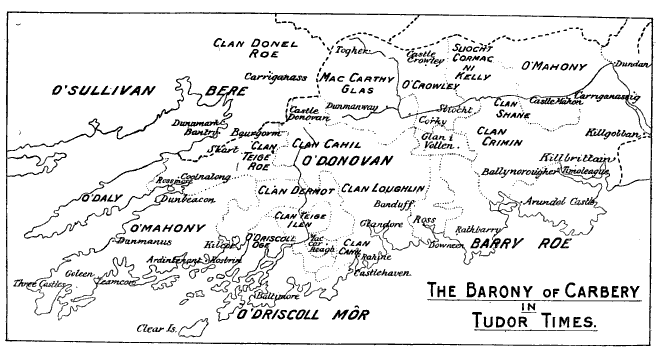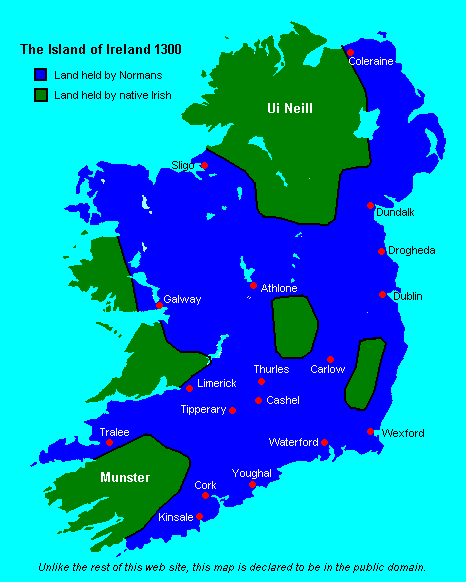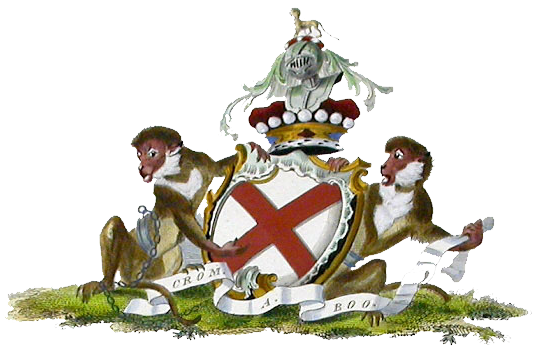|
James FitzGerald, 8th Earl Of Desmond
James FitzGerald, 8th Earl of Desmond (1459– 1487) was the son of Thomas FitzGerald, 7th Earl of Desmond and his wife, Ellice de Barry, daughter of William Barry, 8th Baron Barry, and Ellen de la Roche. Life The execution of the 7th Earl of Desmond provoked an immediate and violent reaction. The dead earl’s elder sons ‘raised their standards and drew their swords, resolved to avenge their father’s murder’. James's younger brother, Gerald, laid waste a great deal in Leith and Munster in revenge for his father. According to a later account, Edward IV admonished the new Earl of Desmond by letters, and promised them his pardon if they would lay down their arms, which they did. "Now James FitzThomas, having made terms with King Edward, and received immunity for any act which he had committed to avenge his father's death, became Earl of Desmond," in 1471. Webb, Alfred. A Compendium of Irish Biography'. Dublin: 1878. The king felt the need to make amends to the dead ear ... [...More Info...] [...Related Items...] OR: [Wikipedia] [Google] [Baidu] |
Earl Of Desmond
Earl of Desmond is a title in the peerage of Ireland () created four times. When the powerful Earl of Desmond took arms against Queen Elizabeth Tudor, around 1578, along with the King of Spain and the Pope, he was confiscated from his estates, some 574 628 acres of land. Since 1640 the title has been held by the Feilding family as a secondary title of the Earl of Denbigh. History of the Title Barony of Desmond The original Barony of Desmond in the province of Munster was held by descendants of Thomas FitzMaurice, Lord OConnello. Thomas was the eldest son of Maurice FitzGerald, Lord of Lanstephan and he was a key supporter of the Lord of Pembroke known as ("Strongbow") in his 1169 invasion of Ireland. Maurice FitzGerald, Lord of Lanstephan was the founder of the FitzMaurice/ FitzGerald Dynasty in Ireland. Being descended from the eldest son of Maurice FitzGerald, Lord of Lanstephan, the House of Desmond was a cadet branch of the famous Geraldines; the senior branch ... [...More Info...] [...Related Items...] OR: [Wikipedia] [Google] [Baidu] |
MacCarthy Reagh
The Mac Cárthaigh Riabhach (anglicised ''MacCarthy Reagh'') dynasty are a branch of the MacCarthy dynasty, Kings of Desmond, deriving from the Eóganacht Chaisil sept. History The Mac Cárthaigh Riabhach seated themselves as kings of Carbery in what is now southwestern County Cork including Rosscarbery in the 13th century.Butler, "The Barony of Carbery" Their primary allies in the initially small territory itself were O'Donovans, and members of the Ui Chairpre; both were recent arrivals, gaining their lands from the O'Mahonys of Eóganacht Raithlind and the O'Driscolls of Corcu Loígde. The historical record for this period is very confused and a precise sequence of events cannot be reconstructed. A portion of Carbery was conquered around 1232 by Donal Gott MacCarthy, King of Desmond, from whom the dynasty descend. His son Donal Maol Mac Carthaigh, was the first ruler of the new principality. Their descendants would expand their territories considerably and forge a small, wealth ... [...More Info...] [...Related Items...] OR: [Wikipedia] [Google] [Baidu] |
1459 Births
Year 1459 ( MCDLIX) was a common year starting on Monday (link will display the full calendar) of the Julian calendar. Events January–December * January 18 – The Order of Our Lady of Bethlehem is founded by Pope Pius II, to defend the island of Lemnos. * September 23 – Wars of the Roses: Battle of Blore Heath in England – Yorkists under Richard Neville, 5th Earl of Salisbury, defeat a Lancastrian force. * October 12 – Wars of the Roses: With a royal force advancing on his fortress at Ludlow, Richard Plantagenet, Duke of York, flees to Ireland, while his ally Richard Neville, 16th Earl of Warwick (Warwick the Kingmaker, eldest son of the Earl of Salisbury) goes to Calais. Date unknown * The Wallachian town of Bucharest is first mentioned. * The city of Jodhpur, in western India, is founded by Rao Jodha of Marwar. * Richard, Duke of York, Lord Lieutenant of Ireland, returns on a second visit to Ireland.''The Oxford Illustrated History of Ire ... [...More Info...] [...Related Items...] OR: [Wikipedia] [Google] [Baidu] |
Norman Warriors
Norman or Normans may refer to: Ethnic and cultural identity * The Normans, a people partly descended from Norse Vikings who settled in the territory of Normandy in France in the 10th and 11th centuries ** People or things connected with the Norman conquest of southern Italy in the 11th and 12th centuries ** Norman dynasty, a series of monarchs in England and Normandy ** Norman architecture, romanesque architecture in England and elsewhere ** Norman language, spoken in Normandy ** People or things connected with the French region of Normandy Arts and entertainment * ''Norman'' (film), a 2010 drama film * '' Norman: The Moderate Rise and Tragic Fall of a New York Fixer'', a 2016 film * ''Norman'' (TV series), a 1970 British sitcom starring Norman Wisdom * ''The Normans'' (TV series), a documentary * "Norman" (song), a 1962 song written by John D. Loudermilk and recorded by Sue Thompson * "Norman (He's a Rebel)", a song by Mo-dettes from ''The Story So Far'', 1980 Businesses * ... [...More Info...] [...Related Items...] OR: [Wikipedia] [Google] [Baidu] |
Normans In Ireland
From the 12th century onwards, a group of Normans invaded and settled in Gaelic Ireland. These settlers later became known as Norman Irish or Hiberno-Normans. They originated mainly among Cambro-Norman families in Wales and Anglo-Normans from England, who were loyal to the Kingdom of England, and the English state supported their claims to territory in the various realms then comprising Ireland. During the High Middle Ages and Late Middle Ages the Hiberno-Normans constituted a feudal aristocracy and merchant oligarchy, known as the Lordship of Ireland. In Ireland, the Normans were also closely associated with the Gregorian Reform of the Catholic Church in Ireland. Over time the descendants of the 12th-century Norman settlers spread throughout Ireland and around the world, as part of the Irish diaspora; they ceased, in most cases, to identify as Norman, Cambro-Norman or Anglo-Norman. The dominance of the Norman Irish declined during the 16th century, after a new English Protes ... [...More Info...] [...Related Items...] OR: [Wikipedia] [Google] [Baidu] |
15th-century Irish People
The 15th century was the century which spans the Julian calendar, Julian dates from 1 January 1401 (Roman numerals, MCDI) to 31 December 1500 (Roman numerals, MD). In History of Europe, Europe, the 15th century includes parts of the Late Middle Ages, the Early Renaissance, and the early modern period. Many technological, social and cultural developments of the 15th century can in retrospect be seen as heralding the "European miracle" of the following centuries. The Perspective (graphical), architectural perspective, and the modern fields which are known today as banking and accounting were founded in Italy. The Hundred Years' War ended with a decisive Kingdom of France, French victory over the Kingdom of England, English in the Battle of Castillon. Financial troubles in England following the conflict resulted in the Wars of the Roses, a series of dynastic wars for the throne of England. The conflicts ended with the defeat of Richard III by Henry VII of England, Henry VII at th ... [...More Info...] [...Related Items...] OR: [Wikipedia] [Google] [Baidu] |
FitzGerald Dynasty
The FitzGerald/FitzMaurice Dynasty is a noble and aristocratic dynasty of Cambro-Norman, Anglo-Norman and later Hiberno-Norman origin. They have been peers of Ireland since at least the 13th century, and are described in the Annals of the Four Masters as having become "more Irish than the Irish themselves" or Gaels, due to assimilation with the native Gaelic aristocratic and popular culture. The dynasty has also been referred to as the Geraldines and Ireland's largest landowners. They achieved power through the conquest of large swathes of Irish territory by the sons and grandsons of Gerald of Windsor (c. 1075 – 1135). Gerald of Windsor ( Gerald FitzWalter) was the first Castellan of Pembroke Castle in Wales, and became the male progenitor of the FitzMaurice and FitzGerald Dynasty ("fitz", from the Anglo-Norman ''fils'' indicating "sons of" Gerald). His father, Baron Walter FitzOther, was the first Constable and Governor of Windsor Castle for William the Conqueror, an ... [...More Info...] [...Related Items...] OR: [Wikipedia] [Google] [Baidu] |
Elizabeth Butler, Countess Of Ormond
Elizabeth Butler (''nee'' Darcy), Countess of Ormond (3 April 1332 – 24 March 1390), was the wife of Irish peer James Butler, 2nd Earl of Ormond, and the mother of his six children, including James Butler, 3rd Earl of Ormond. Family and lineage Elizabeth Darcy was born on 3 April 1332 at Platten, County Meath, Ireland, the daughter of Sir John Darcy, 1st Baron Darcy de Knayth, Justiciar of Ireland, and his second wife Joan de Burgh. Sir John was a veteran of the Battle of Crecy. He held the offices of Constable of Nottingham Castle, Constable of the Tower of London, and Sheriff of Lancashire. From 1341- 1346, he was Chamberlain to King Edward III. Elizabeth had a brother, Sir William Darcy, who married Catherine FitzGerald, by whom he had issue. She also had numerous half-siblings from her parents' previous marriages. Her father's first wife was Emeline Heron, by whom he had eight children, including his heir, John Darcy, 2nd Baron Darcy of Knaith. Elizabeth's mother's first ... [...More Info...] [...Related Items...] OR: [Wikipedia] [Google] [Baidu] |
James Butler, 2nd Earl Of Ormond
James Butler, 2nd Earl of Ormond (4 October 133118 October 1382) was a noble in the Peerage of Ireland. He was Lord Justice of Ireland in 1359, 1364, and 1376, and a dominant political leader in Ireland in the 1360s and 1370s. The son of James Butler, 1st Earl of Ormond and Lady Eleanor de Bohun, James was born at Kilkenny Castle and given in ward on 1 September 1344 to Maurice FitzGerald, 1st Earl of Desmond for the fine of 2,306 marks; and afterwards to Sir John Darcy who married him to his daughter Elizabeth. He was usually called The Noble Earl, being a great-grandson, through his mother, of King Edward I of England. He died at Knocktopher Castle in Kilkenny, Leinster, Ireland. Career In 1362, he slew 600 of Mac Murrough's followers at Teigstaffen ( County Kilkenny). On 22 April 1364, was appointed Lord Deputy of Ireland to Lionel of Antwerp, Duke of Clarence: Clarence, from his first arrival in Ireland, placed great trust in him, and for a few years it seems that as Dep ... [...More Info...] [...Related Items...] OR: [Wikipedia] [Google] [Baidu] |
Maurice FitzGerald, 1st Earl Of Desmond
Maurice FitzThomas FitzGerald, 1st Earl of Desmond (died 25 January 1356) in Dublin Castle, Dublin, Ireland was an Irish nobleman in the Peerage of Ireland, Captain of Desmond Castle in Kinsale, so-called ruler of Munster, and for a short time Lord Justice of Ireland. Called "Maurice the Great", he led a rebellion against the Crown, but he was ultimately restored to favour. Background He was the second son of Thomas FitzMaurice FitzGerald, 2nd Baron Desmond by his wife Margaret, whose family background is still in dispute (she belonged either to the family of Barry or de Burgh). His father died in 1298 when Maurice was still a child. Maurice succeeded his elder brother Thomas FitzGerald, 3rd Baron Desmond as 4th Baron Desmond in 1307, and also inherited great wealth and large estates. Influence By 1326 his influence was such that there were rumours of a conspiracy to make him King of Ireland; modern historians tend to dismiss the story, on the ground that the alleged conspi ... [...More Info...] [...Related Items...] OR: [Wikipedia] [Google] [Baidu] |
Gerald FitzGerald, 3rd Earl Of Desmond
Gerald FitzMaurice FitzGerald (1335–1398), Webb, Alfred. A Compendium of Irish Biography'. Dublin: 1878. also known by the Irish Gaelic ''Gearóid Iarla'' (Earl Gerald), was the 3rd Earl of Desmond, in southwestern Ireland, under the first creation of that title, and a member of the Hiberno-Norman dynasty of the FitzGerald, or Geraldines. He was the son of Maurice FitzGerald, 1st Earl of Desmond, by his third wife Aveline (Eleanor), daughter of Nicholas FitzMaurice, 3rd Lord of Kerry. He was half-brother to Maurice FitzGerald, 2nd Earl of Desmond. Maurice Fitzgerald, 2nd Earl of Desmond, would have been followed by Gerald's older brother, Nicholas, but Nicholas was described as "an idiot", and so was passed over for the earldom. Because of this, some older histories list Gerald as the 4th Earl. Life In 1356 he was brought to England as a hostage for his father's good behaviour, but as his father died that same year, he was soon released. Three years later, he succeeded ... [...More Info...] [...Related Items...] OR: [Wikipedia] [Google] [Baidu] |
De Burgh
de Burgh (also spelt de Bourgh, and Burke, and also Latinised as de Burgo) is an Anglo-Norman surname deriving from the ancient Anglo-Norman and Hiberno-Norman noble dynasty, the House of Burgh. In Ireland, the descendants of William de Burgh (c.1160–1206) had the surname ''de Burgh'' which was gaelicised in Irish as ''de Búrca'' and over the centuries became ''Búrc'' then Burke and Bourke. Notable people with this name include: Surname A * Aoife de Búrca (1885–1974), born Eva Burke, Red Cross nurse during the Irish Easter Rising C * Coralie de Burgh (1924–2015), British Irish painter * Cameron de Burgh (born 1971), Australian Paralympic swimmer * Chris de Burgh (born 1948), musician and songwriter D * David de Burca or David de Burgh, 15th Mac William Iochtar (alive 1537), Irish chieftain and noble E * Edmond Albanach de Burgh (d.1375), Lord of Connaught * Edmond de Burca or Edmond de Burgh, 12th Mac William Iochtar (died 1527), Irish chieftain and nobl ... [...More Info...] [...Related Items...] OR: [Wikipedia] [Google] [Baidu] |






